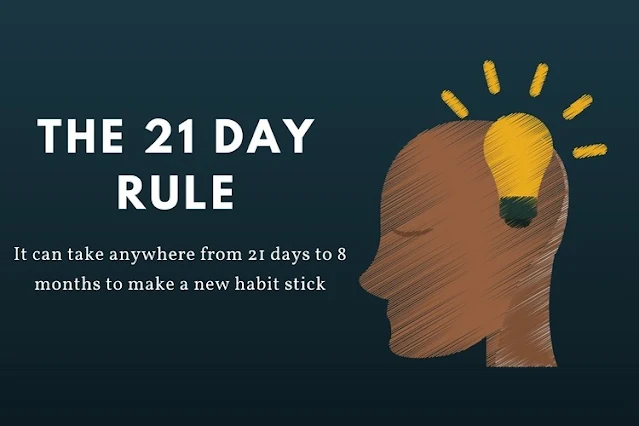Hello beautiful people,
Welcome to a journey of self-improvement and personal transformation! Have you ever wondered how to create lasting habits or be consistent with some habits? In the next few minutes, we'll explore the fascinating concept of the '21-Day Rule' and how it can be a powerful catalyst for positive change in your life. Whether you're looking to develop new habits, overcome challenges, or simply want to understand the science behind habit formation.
So let's get started with today's blog.
INTRO
The idea that it takes 21 days to form a new habit has been widely popularized in self-help literature and personal development circles. The concept suggests that consistent and focused effort for three weeks is enough to establish a behavior pattern that sticks. But is there any scientific basis to this notion, or is it merely a myth? In this article, we will explore the origins of the "21 days" concept, examine the research behind it, and discuss the reality of habit formation.
The Origin of the 21-Day Rule
The idea that it takes 21 days to form a new habit can be traced back to the work of Dr. Maxwell Maltz, a plastic surgeon, and author, who wrote the self-help book "Psycho-Cybernetics" in 1960. In the book, Maltz suggested that it takes 21 days to adjust to a physical change, such as a patient getting used to their new appearance after plastic surgery. Over time, this concept was generalized to apply to various habits and behaviors.
The Science of Habit Formation
.jpg) While Dr. Maltz's work popularized the idea of 21 days, modern research on habit formation suggests a more nuanced and variable timeline. According to a study published in the European Journal of Social Psychology in 2010, it takes an average of 66 days for a habit to become automatic. However, the time required for habit formation can vary widely, ranging from just a few weeks to several months, depending on the individual and the complexity of the habit.
While Dr. Maltz's work popularized the idea of 21 days, modern research on habit formation suggests a more nuanced and variable timeline. According to a study published in the European Journal of Social Psychology in 2010, it takes an average of 66 days for a habit to become automatic. However, the time required for habit formation can vary widely, ranging from just a few weeks to several months, depending on the individual and the complexity of the habit.
Key Factors in Habit Formation
1. Behavior Complexity: Simple habits, like drinking a glass of water every morning, may form more quickly than complex habits, such as starting a daily exercise routine.
2. Individual Differences: People vary in their ability to establish new habits. Some may adapt more quickly, while others require more time and effort.
3. Consistency: Regular and consistent practice is essential for habit formation. Skipping days can significantly slow down the process.
4. Motivation: The level of motivation and commitment to the habit can influence how long it takes to establish it.
5. Repetition and Practice: Repetition is crucial for habit formation. The more you perform a specific behavior, the more likely it is to become a habit.
Setting Realistic Expectations
The 21-day rule has gained popularity because it provides a simple and achievable timeframe for those looking to make positive changes in their lives. While it may work for some individuals and simple habits, it is essential to set realistic expectations and recognize that habit formation is a highly individualized process.
If you are looking to establish a new habit, focus on consistency, motivation, and patience rather than fixating on a specific number of days. Celebrate small victories along the way and understand that the journey to habit formation is more about the process than the precise timeframe.
Conclusion
The 21-day rule, while a well-known concept, is not a one-size-fits-all solution for habit formation. The time it takes to establish a new habit varies depending on the complexity of the behavior, individual differences, and other factors. Instead of obsessing over a specific number of days, it's more important to stay committed, be consistent, and remain motivated on your journey to creating positive and lasting changes in your life. Forming habits is a personal and evolving process, and patience is key to long-term success.
So That's it for Today's Blog
Hope You Like IT.


Comments
Post a Comment